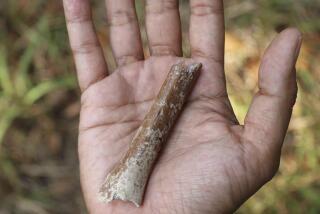Rapetosaurus krausei: Tiny titanosaurus was just a few weeks old, scientists say
- Share via
Scientists examining the bones of a baby titanosaur from Madagascar have found that the young sauropods actually looked like miniature adults. The findings, described in the journal Science, shed fresh light on the development and behavior of these large long-necked dinosaurs.
For many creatures in the animal kingdom, the young look very different from the adult stage. Human babies, for example, have much larger heads relative to their body size than adults do. Imagine how odd it would look if an infant had a body like a miniature adult.
And yet that’s exactly what happens for the sauropod known as Rapetosaurus krausei, according to a new paper led by paleontologist Kristina Curry Rogers of Macalester College in St. Paul, Minn. Curry Rogers came across the strange fossils while sifting through a jumble of crocodile and turtle bones at Stony Brook University that had been collected from Madagascar.
See the most-read stories in Science this hour >>
Turtle crocodile bones are shapely and sinuous, but these bones were columnar — straighter and simpler looking — and bore muscle scars and articular surfaces that she found very familiar.
“I recognized them immediately as Rapetosaurus, because they look so similar,” said Curry Rogers, who was one of the scientists to name the species.
Young dinosaur fossils aren’t easy to come by. Many animals don’t spend much of their lives in a juvenile stage, and smaller bones are also harder to preserve over the eons. As a result, scientists know relatively little about how sauropods such as Rapetosaurus grew up.
“Baby dinosaurs in general are rare, and I would say that for sauropods they have been even rarer,” Curry Rogers said.
So the scientists analyzed the specimen, which included bones from the limbs, vertebrae and even the hip. They studied patterns in the bone and subjected them to CT scans to look for growth patterns in their structure.
Rapetosaurus krausei plodded across the Earth during the Cretaceous period, growing some 40 to 50 feet long. Young or no, this baby dinosaur was already pretty big by the time it died, weighing in at approximately 40 kilograms and standing 35 centimeters tall at the hip, even though it was only a few weeks old. That’s a pretty big jump since hatching, when this dinosaur probably weighed about 3.4 kilograms.
Fast growth doesn’t seem to be an uncommon trait for large herbivorous dinosaurs — it minimized the time that they spent being targets for hungry predators looking for an easy meal. But the adult-like proportions of their bodies hint to researchers that these animals probably had to start fending for themselves pretty early in life.
“For sauropods, it doesn’t appear that they were very good parents — at least after their babies hatched,” Curry Rogers said.
That life may have been a rough one. The scientists calculated that this young dinosaur only lived from 39 to 77 days. The tiny titanosaur likely died of starvation, perhaps a victim of an ongoing drought at the time.
Follow @aminawrite on Twitter for more science news and “like” Los Angeles Times Science & Health on Facebook.
MORE FROM SCIENCE
Loneliness: The new (old) smoking?
New genome editing technique can target single letters of DNA sequence
Global warming has made the weather better for most in U.S. -- but don’t get used to it, study says






